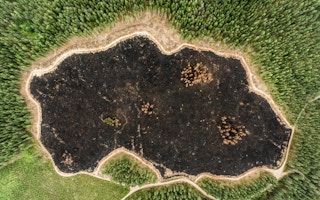Biodiversity loss is one of the greatest existential crises of our time. Current estimates suggest that we are losing more than ten thousand species to extinction per year — a thousand times faster than at any other point in history, due to human activity.
To continue reading, subscribe to Eco‑Business.
There's something for everyone. We offer a range of subscription plans.
- Access our stories and receive our Insights Weekly newsletter with the free EB Member plan.
- Unlock unlimited access to our content and archive with EB Circle.
- Publish your content with EB Premium.
Organisations like the 75-year-old International Union for Conservation of Nature (IUCN), which is responsible for the Red List of Endangered Species, have devoted years to preserving biodiversity.
But at this critical juncture, its work and that of other conservation organisations is hampered by the predominance of restricted funding — funds that are earmarked for specific, often short-term projects.
Addressing the biodiversity crisis requires long-term research, field projects, advocacy, and education — not to mention institutional overhead like rent and salaries — that can best be maintained through unrestricted funding.
Yet from 2009 to 2019, the IUCN’s annual unrestricted income saw a decrease from US$45.5 million to $35.5 million. By comparison, from 2010 to 2019 their restricted annual income increased from $86.5 million to $100 million, and now accounts for 75 per cent of its revenue.
The majority of the world’s conservation NGOs face similar patterns. Many smaller organisations, which serve as foot soldiers in the fight against biodiversity loss, often have only a 12-month funding horizon, forcing them into the role of reactive, short-term thinkers who spend massive resources on reporting project-based outcomes.
Right now, grants from most donor agencies are restricted to specific projects with predefined outcomes. While these grants help support field staff and activities, there are often caps for project-related overhead and support staff.
The grants are also often tied to key performance indicators and other deliverables whose reporting requires costly project managers, accountants, and auditors. Such grants make it very difficult to build and nurture the sort of future-oriented approaches which are essential to species conservation.
“
The economic and social fallout of the pandemic has challenged the viability of and exposed weaknesses in ecotourism and related funding sources. If even one of the primary financial mechanisms we rely on to support conservation efforts is potentially unsound, we risk losing ground in our war against the extinction crisis at a time when we can ill afford to lose even one battle.
The solution is for national governments, philanthropies, and other funding organisations to provide long-term, unrestricted funds to conservation organisations that would support the far-reaching strategies that they are best positioned to plan and carry out.
A group of nations — including Denmark, Finland, France, Norway, South Korea, Sweden, Switzerland, and the United States — offer an example that other funders should look to as a model.
These countries, known as IUCN Framework Donors, provide the organisation with critical unrestricted support for organisation building, innovation, development and maturation of science-based conservation tools (such as the IUCN Red List), issue and policy advocacy, and long-term strategic planning to match the timeline for reversing biodiversity loss.
One positive outcome of the Covid-19 pandemic is that it could spark a wider embrace of unrestricted funding. Last year, nearly 800 donors — both in the U.S. and abroad — signed a pledge to provide the organisations they fund more flexibility in their pandemic response.
At the Mohamed bin Zayed Species Conservation Fund (MBZ Fund), which provides thousands of small grants to species conservation projects worldwide, we began providing unrestricted Covid-19 relief grants to help struggling conservation NGOs cover core costs, and have distributed more than $1 million under this programme to-date.
One recipient, Hustai National Park in Mongolia, used their grant to pay park rangers who protect the endangered Przewalski’s horse from poaching and illegal grazing. Without these funds, and the freedom to direct the funds where they were most needed, much of the organisation’s recent conservation success would have been erased.
Our challenge now is to ensure that this more flexible approach to conservation funding outlasts the pandemic. The collapse of ecotourism during the Covid-19 pandemic has only underscored the importance of unrestricted funding.
Ecotourism currently accounts for approximately 84 per cent of funding for national parks agencies worldwide — an over-reliance that has proven devastating during the pandemic.
The World Travel and Tourism Council recently estimated the loss of African ecotourism revenue due to travel restrictions to be between $53 billion and $120 billion, depriving the continent’s national parks — where paid rangers play a vital role in protecting endangered species — of a critical source of revenue.
Conservation NGOs have also been hit hard by the pandemic’s impact on zoos and aquariums, many of which donate profits from ticket and concession sales to conservation efforts worldwide.
The economic and social fallout of the pandemic has challenged the viability of and exposed weaknesses in ecotourism and related funding sources.
If even one of the primary financial mechanisms we rely on to support conservation efforts is potentially unsound, we risk losing ground in our war against the extinction crisis at a time when we can ill afford to lose even one battle.
As the world recovers from the pandemic, we must seize the opportunity to reimagine and rethink how we fund conservation for the long term. Stopping biodiversity loss takes decades of sustained effort, and right now we can ill afford to increasingly rely upon short-term, project-specific grants.
Governments, foundations, and philanthropists must take the lead in prioritising effective, consistent support in the form of unrestricted funding for the conservation organizations fighting on the front lines of the extinction crisis.
Razan Al Mubarak is the founding managing director of the Mohamed bin Zayed Species Conservation Fund and the managing director of Emirates Nature-WWF. In 2018, the World Economic Forum selected her as one of the top 100 Young Global Leaders.












